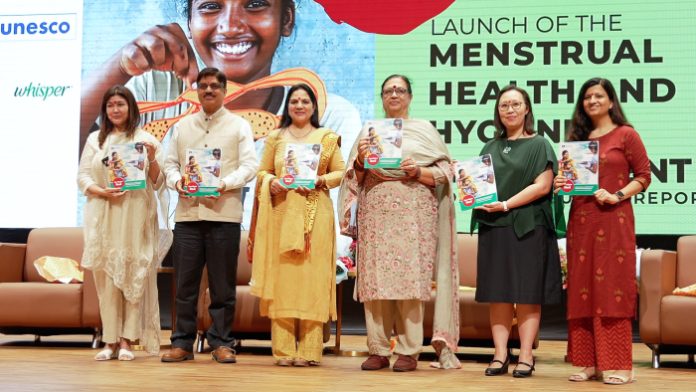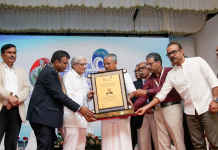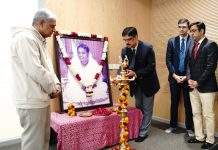Unesco India and Amrita Vishwa Vidyapeetham recently came together to launch a campaign to create awareness among women, especially young and school-going girls, about menstrual health and hygiene management. The event, held at Amrita Hospital, Faridabad, marked the national launch of a coffee table book, a national survey and gap analysis report, and five teaching-learning modules by Unesco India, addressing the challenges related to menstrual health and hygiene management, including in relation to disability, gender, teachers and educators, young adults and nutrition.
The teaching-learning modules, titled Spotlight Red, provide learners, educators, menstruators, and community leaders with resources and strategies for comprehensive understanding and skill development in managing menstruation and driving awareness about its societal impact. They aim to empower adolescents of diverse groups, including girls with disabilities, with access to period and puberty education and create a supportive environment with interventions at the school, state, and national levels to help them continue their education.
A National Survey and Gap Analysis report on Menstrual Health and Hygiene Management under the initiative #KeepGirlsinSchool was also launched by Unesco India. Thirty-five girls from an orphanage in Faridabad were given menstrual health kits at the launch event. The Unesco Chair for Gender Equality & Women’s Empowerment, Amrita Vishwa Vidyapeetham, and the Civil20 India Working Groups on Gender Equality and Integrated Holistic Health are advocacy partners of the #KeepGirlsinSchool initiative.
The dignitaries present at the launch included Joyce Poan, program specialist & chief of education and Huma Masood, gender specialist, with Unesco New Delhi multisectoral regional office; Seema Trikha, MLA of Badhkhal, Faridabad; Punita Hasija, president, Indian Medical Association, Faridabad; Sanjeev Singh, medical director, Amrita Hospital, Faridabad; Pratima Mittal, head, and Shweta Mendiratta, senior consultant with the department of obstetrics and gynecology, Amrita Hospital, Faridabad; Priya Nair, coordinator of C20 Working Group on Integrated Holistic Health; Bhavani Rao, C20 coordinator of the Working Group on Gender Equality and Unesco Chair on Gender Equality and Women’s Empowerment; and Kruti Desai, brand director – Communications, P&G.
Huma Masood said menstruation is a natural biological process, but the shame, heavy stigma and misconception attached to it are prevalent even today. “The fact that prime minister Narendra Modi mentioned the topic in his speech for Independence Day in 2020 was unexpected and unprecedented. The government of India through its various schemes and program has ensured inclusion and equal access to menstrual products and education. The ‘Keep Girls in School’ initiative of UNESCO will add to the momentum generated through these schemes and catalyze equal access to education about menstrual health and hygiene management for all.”
Addressing the audience, Seema Trikha said: “Every woman, regardless of her social and economic background, deserves access to sanitary pads and proper menstrual hygiene. In schools, it is essential for teaching and non-teaching staff to promote awareness about menstrual hygiene. NGOs, hospitals, Anganwadi workers, and the Haryana Government should all collaborate to spearhead this initiative. Let us ensure that no woman is left behind, and together, we create a society where menstrual hygiene is prioritized and accessible to all.”
Priya Nair said there is an urgent need for us to raise awareness of menstrual hygiene and health. “Menstruation is the most natural process in a woman’s life and this needs to be addressed with pride instead of shame.”
Bhavani Rao said, “I am delighted to be a part of this conversation on menstrual health and hygiene. India currently holds the G20 Presidency, and it is an honor to have Sri Mata Amritanandamayi Devi as the C20 Chair. Under her leadership, five working groups of C20 are being hosted, two of which focus on integrated holistic health and gender equality. The conversation on menstrual health aligns perfectly with the theme of these, and the topic has repeatedly emerged in our policy deliberations. It is essential to shift the conversation towards environmentally friendly products and ensure the active involvement of women in their manufacturing and marketing.”









